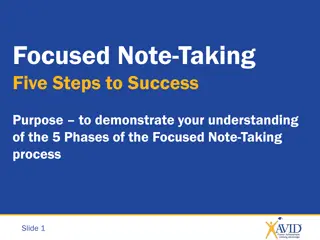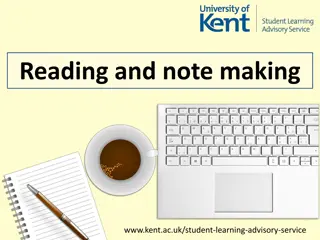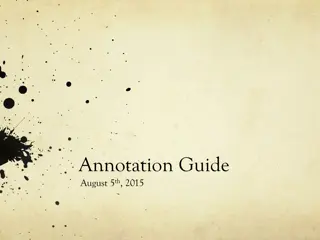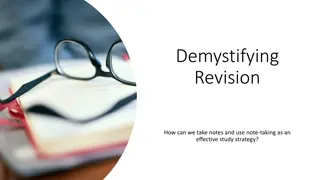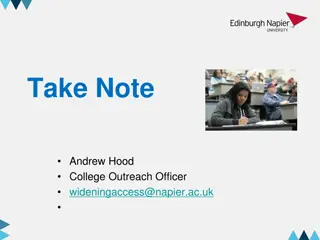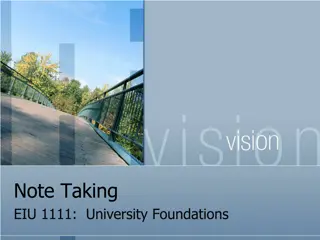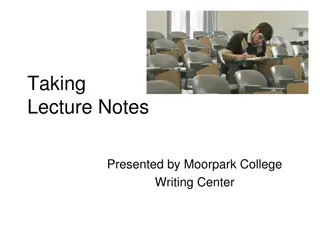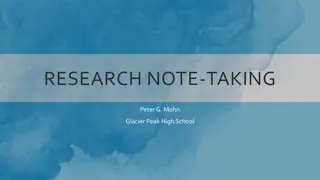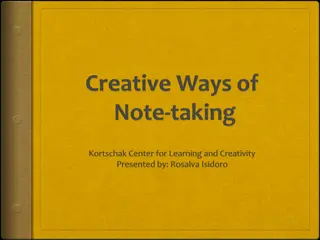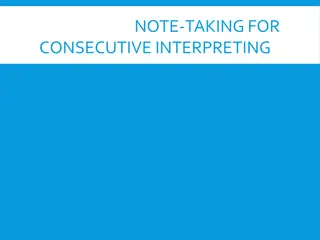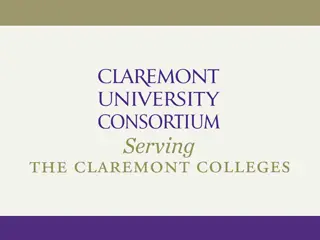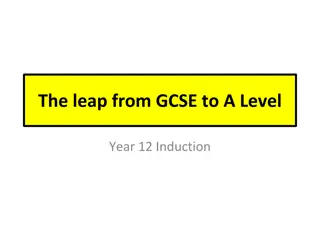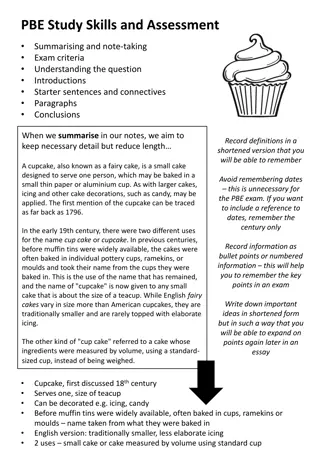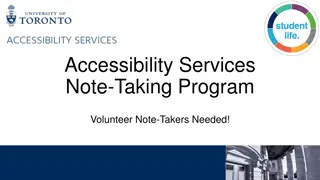Consecutive Interpreting Note-Taking Techniques
This content provides valuable insights on consecutive interpreting note-taking, emphasizing the importance of macro- and micro-thinking, the use of spiral notebooks, identifying subject-verb-object structures, and effective listening strategies. It offers practical tips on how to enhance note-taking skills and improve comprehension during interpreting sessions.
Download Presentation

Please find below an Image/Link to download the presentation.
The content on the website is provided AS IS for your information and personal use only. It may not be sold, licensed, or shared on other websites without obtaining consent from the author.If you encounter any issues during the download, it is possible that the publisher has removed the file from their server.
You are allowed to download the files provided on this website for personal or commercial use, subject to the condition that they are used lawfully. All files are the property of their respective owners.
The content on the website is provided AS IS for your information and personal use only. It may not be sold, licensed, or shared on other websites without obtaining consent from the author.
E N D
Presentation Transcript
Week 19 Sophomore Literature and Composition
Socratic Discussion Grading A: Responding to the prompt without prompting; responding to Conversation Partner without prompting; asking questions to either partner or Mr. Burns; never going off topic; not sleeping; not using phone; not working on homework from other classes B: Responding to the prompt without prompting; responding to Conversation Partner without prompting; asking a question to Mr. Burns; never going off topic; not sleeping; not using phone; not working on homework from other classes C: commenting; asking questions; needs prompting once; needs prompting on who Conversation Partner is; off topic once; may use cellphone once D: off topic; barely comments; doesn t ask questions; needs prompting often; doesn t remember Conversation Partner; constant cell phone use F: no commenting; no questioning; needs prompting often; sleeping; constant cell phone use; homework from other class out; doesn t remember Conversation Partner
Monday, December 9th, 2019 Questions of the Week: (Preparation for the Socratic Discussion) 1. In your own words, what do you think the meaning of nature is? 2. In your own words, what do you think the meaning of natural is?
Memorization (3-minutes) 1. Pair up with your conversation partner 2. One person stands while the other sits. 3. The person standing will recite his or her quote. 4. The person sitting will follow along and make sure he or she is reciting the quote correctly. 5. After the found round, switch and follow Steps 2-4 again.
Frankenstein Found Vocabulary 1.You must locate 6 unfamiliar vocabulary words from Chapters 3-5. (2 per chapter) a. Must define each word b. Write the sentence from the text c. Use it in your own sentence
Frankenstein by Mary Shelley (Ch. 3) Wrecking the Text to Bring it Life 1. 2. 3. 4. 5. Who is doing the action? (Characters) Squiggle line What is going on here? (Plot) One underline How is the author getting the point across? (Theme/Ideas) Double underline Which part is a favorite? Box What questions do you have about Chapter 3? Create five questions that must include the following words at the beginning of the question: a. What b. When c. How d. Where e. Why
Examples of Questions You will test these questions on your Conversation Partner. Examples: 1. 2. 3. 4. 5. When is it the best time for man to leave his parents? Why do scientists believe [t]hey have ascend[ed] into the heavens? How does the university of Ingolstadt have a connection with the Illuminati? Where do Victor s desires to be alone with his studies originate from? What can a young man learn from the study of Natural Philosophy?
Several references to nature and natural in Frankenstein On this occasion a man of great research in natural philosophy The world was to me a secret which I desired to divine. Curiosity, earnest research to learn the hidden laws of nature, gladness akin to rapture, as they were unfolded to me, are among the earliest sensation I can remember. I have myself as always having been imbued with a fervent longing to penetrate the secrets of nature. He had partially unveiled the face of Nature. ...that seemed to keep human beings from entering the citadel of nature.
Socratic Discussion 1. 2. 3. It will occur at the beginning of each class. After the students respond to the bellwork prompt. The Socratic Discussion will last 7-minutes or 10-minutes depending on how rich the discussion is. Students will be assessed based on their participation. Monday, Tuesday, and Friday are the days you will be assessed. The topic will be over an idea from Mary Shelley s Frankenstein. It is worth 20 points. The next slide explains how you will be graded. 4. 5. 6. 7. 8.
Nature (noun) The way things are. Nature is used for the agent, creator, author, producer of things, or for the powers that produce them. By the expression, trees and fossils are produced by nature we mean, they are formed or produced by certain inherent powers in matter, or we mean that they are produced by God, the Creator, the Author of whatever is made or produced. When we speak of the nature of man, we understand the peculiar constitution of his body or mind,or the qualities of the species which distinguished him from others animals. When we speak of the nature of a man, or an individual of the race, we mean his particular qualities or constitution; either the peculiar temperament of his body, or the affections of his mind, his natural appetites, passions, disposition or temper. So of irrational animals. (Webster s Dictionary 1828)
Natural (adjective or noun) To be born or produced Pertaining to nature; produced or effected by nature, or by the laws of growth, formation or motion impressed on bodies or beings by divine power. Thus we speak of the natural growth of animals or plants; the natural motion of gravitating body; natural strength or disposition; the natural heat of the body; natural color; natural beauty. In this sense, natural is opposed to artificial or acquired. Natural philosophy, the science of material bodies, of their properties, powers and motions. It is distinguished from intellectual and moral philosophy, which respect the mind or understanding of man and the qualities of actions.
Tuesday, December 10th, 2019 Bellwork: Yesterday, you defined what is nature and what is natural. Now, you have seen the definition of nature/natural. Now write about what are examples of nature or natural and what are examples of something that is not nature or not natural. Write your responses in your composition book then we will discuss.
Frankenstein by Mary Shelley (Ch. 3 and 4) Wrecking the Text to Bring it Life 1. 2. 3. 4. 5. Who is doing the action? (Characters) Squiggle line What is going on here? (Plot) One underline How is the author getting the point across? (Theme/Ideas) Double underline Which part is a favorite? Box What questions do you have about Chapter 3? Create five questions that must include the following words at the beginning of the question: a. What b. When c. How d. Where e. Why
Examples of Questions You will test these questions on your Conversation Partner. Examples: 1. 2. 3. 4. 5. When is it the best time for man to leave his parents? Why do scientists believe [t]hey have ascend[ed] into the heavens? How does the university of Ingolstadt have a connection with the Illuminati? Where do Victor s desires to be alone with his studies originate from? What can a young man learn from the study of Natural Philosophy?
Final Written Exam Block Days Backpacks placed in the front of class. Cellphones, earbuds, smart watches and headphones placed in the front pocket of backpack. Need 1-2 pieces of leaflet paper or a spiral notebook Need the following colored highlighters: green, yellow, pink, blue, and orange Need a writing utensil Need the print outs of Frankenstein and a textbook.
Must complete the following tasks: Pick one of the four essential questions Must follow the Argumentative Essay guidelines Must complete the brainstorming: 7-minutes Must complete the Gathering Quotes section (The Raven (pg. 103), The Fall of the House of Usher (pg. 13), or Frankenstein): 30-minutes Must complete the Self-Edit section Must complete the Color Coding Your Essay section
Examples of How to Integrate Textual Evidence into your Writing According to the author, Insert textual evidence (Poe Page #). As stated in the text, The author illustrates this point when she states, Edgar Allan Poe wrote, Insert textual evidence. No citation needed Toward the end of the story Victor says, For instance, As noted on page 79, For example, As Mary Shelley points out, An example of this occurs when the main character says, In the words of
Socratic Discussion Essential Questions 1. What are the ethics involved in our control over nature? What are ethics? 2. Should people take control over nature?



